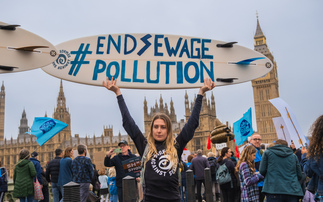Countries approve new 48-page draft, as officials say prospects of a deal are brighter than in Copenhagen
Officials from nearly 200 countries today approved a draft text that is expected to form the basis of climate change deal agreed in Paris next week, with the prospects of an agreement seeming stronger than in Copenhagen six years ago.
At a plenary session at the Le Bourget site this morning, negotiators handed over a 48-page document to the French Presidency, after working through the night to finalise the fourth draft text issued in the past three days.
This latest version will be used by ministers on Monday to work through the many remaining unresolved issues on the table, on track with the schedule set out by the French Presidency.
Some progress has been made on areas such as loss and damage - exploring how to help poor countries with impact of climate change. But the text still contains hundreds of brackets on key issues at stake. Climate finance remains a sticking point, with emerging economies including China and India accusing rich nations of trying to dodge their commitment to provide $100bn per year by 2020 to help poor countries deal with the impacts of climate change.
"We could have been better, we could have been worse, important is that we have a text that we want an agreement next week and all parties want it," said French climate ambassador Laurence Tubiana.
"The job is not done, we need to apply all intelligence, energy, willingness to compromise and all efforts to come to agreement. Nothing is decided until everything is decided."
This morning also marked the official end of the process dubbed the Ad Hoc Working Group on the Durban Platform for Enhanced Action, which was established four years ago by the UN to create the framework for a legally enforceable text to be agreed in 2015.
Halfway through the talks, the prospects of a deal being struck seem higher than in Copenhagen in 2009, when leaders failed to reach a global agreement to tackle climate change. The COP21 text is already significantly shorter than the hundreds of pages given to delegates in Denmark six years ago.
Nearly 190 countries have already outlined specific action plans for how they will reduce carbon emissions and adapt to climate change in the event of a deal, and perhaps most significantly the Chinese delegation are keen to be part of a deal this time round, despite its concerns over finance.
"When we went to Copenhagen there was a lot of hype. It was more like a trade fair than a negotiation," Elina Bardram, the EU's top negotiator told reporters.
Unlike the "flawed" Copenhagen process where presidents arrived on the last day to negotiate the finer details of the text, this time round heads of state arrive at the start, setting the scene for their ministers to reach a final deal, she said.
"So there was this flawed concept that there was going to be a massive negotiation whereas principles don't negotiate details. Ministers do. That's the difference. And now we have an opportunity for ministers to engage."
Richard Black, director of the Energy and Climate Intelligence Unit, said the situation "couldn't be more different" from Copenhagen, "when delegations were more interested in grandstanding than graft.
"You can never predict these things with certainty and countries are some way apart on issues such as finance, but the chances of securing an agreement next weekend that will both constrain climate change and help poor countries prepare for inevitable impacts now look pretty good."
The French presidency has been working hard to ensure the Paris talks remain on schedule, but old fault lines are still as present as ever. Saudi Arabia and Venezuela this week made extensive efforts to derail the process, including blocking issues around human rights and ambition in the agreement, as well as a mention of limiting global warming to 1.5 degrees rather.
They also threw up roadblocks around the definition of terms such as decarbonisation, carbon neutrality, and zero carbon.
But this COP has also featured an extremely strong business presence, with a number of high profile announcements.
Yesterday, Mark Carney, chairman of the Financial Stability Board, launched a Task Force on Climate-related Financial Disclosures to be chaired by former New York Mayor Michael Bloomberg, which aims to boost transparency around corporate action on climate change. And on Monday, Bill Gates, Microsoft founder launched a multi-billion dollar initiative with 27 other private investors, including Facebook founder Mark Zuckerberg and Alibaba chairman Jack Ma, to help scale up clean tech start-ups.
Hundreds of corporates have also joined with governments to demand a global price on carbon is established in order to level the playing field for clean energy investments.
Nigel Topping, chief executive of the We Mean Business Coalition, which represents 335 global corporations and business groups with total revenue of US$7.1tr, said he was optimistic ministers will reach a deal next week that includes a long-term goal on cutting emissions, that will give businesses to signal they say they need to invest in green technologies.
"Nothing is agreed until everything is agreed, but an ambitious long-term goal with a five year review on progress are in our sights," he said. "Now we need a review of progress every five years starting in 2020 and for the countries who are able to step up on mitigation and adaptation finance, with the developed world leading the charge. If governments set up the billions, business will unlock the trillions."
This article is part of BusinessGreen's Road to Paris hub, hosted in association with PwC.








